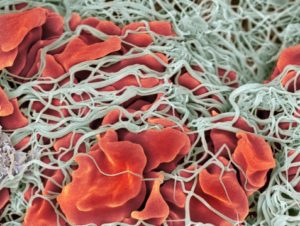Prophylactic platelet transfusions are the standard of care for hypoproliferative thrombocytopenia. Over one thousand adult patients (n=1077) enrolled in a multi-center, randomized clinical trial assessing platelet doses in transfusions (PLADO trial) were followed to identify factors that increase the risk of bleeding in patients with hypoproliferative thrombocytopenia. Chemotherapy and stem cell transplant (SCT) patients were categorized based on the cause of thrombocytopenia—autologous SCT, allogeneic SCT, or chemotherapy. All patients had an increased risk of bleeding compared to patients with normal platelet counts when platelet levels were 5X109/L or below (odds ratio, 3.1; 95% CI, 2.0-4.8). Low hematocrit levels (<25%), international normalized ratio (INR) levels greater than 1.2, and activated partial thromboplastin time (aPTT) greater than 30 seconds were also associated with an increased risk for bleeding. Allogeneic SCT patients had the highest risk of bleeding. Further research is needed to elucidate the relationship between hematocrit and other risk factors for bleeding in thrombocytopenia patients.
References:
2. Carlson JL and SJ Stanworth. Anemia and bleeding in thrombocytopenic patients. Blood 130; 1178-1179

